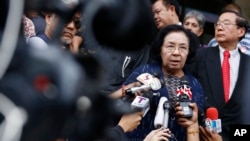The new constitution drafted by Thailand’s military-backed government is aimed at returning the country to democratic rule, but the draft version is already under criticism by a wide range of political parties.
This will be the 20th constitution since Thailand became a constitutional monarchy in 1932, and its supporters say it tries to succeed where the others failed – to create a stable and enduring democracy.
But it has drawn opposition from the country’s two major political parties, who say it weakens their influence and will do little to end the political polarization that has divided the country over the past 15 years.
Panitan Wattanayagorn, a political scientist and an adviser to the government, said the country’s two major parties could mount a serious challenge to the draft before it is scheduled to be finalized in August.
“I’m afraid that it’s not going to be smooth, especially with Pheu Thai members, because they saw themselves as the losers in this constitution. The (former opposition) Democrats are not the same but still they are not happy because the constitution is aimed to reduce their power – at least to create more equal balance," Panitan said.
Creates legislative bodies
The charter creates a 450-seat House of Representatives, whose members are elected under a proportional representation system that analysts say will lead to a greater number of lawmakers from smaller political parties. This would weaken the influence of major political parties, creating a greater need for coalition governments.
An upper house, 200-member Senate will comprise some elected members but also nominated groups, including former members of the military and bureaucracy as well as representatives of labor, farmers, academics and grassroot organizations.
Thida Thavornseth, a senior member of the pro-Pheu Thai Party grassroots organization, the United Front for Democracy against Dictatorship (UDD), said the charter will not lead to political reconciliation.
“No ... not at all; it’s not a charter of democracy. They don’t want to ask the people before they can use this charter. They don’t want to have the strong party, the strong government. And especially you see the prime minister can come from other people, not the MP (member of parliament)," Thida said.
She referred to a controversial clause that would allow for someone to be appointed, not elected, as government leader. It would require a two-thirds backing from the House of Representatives.
Supporters say the move would allow for a way to end political deadlocks, avoiding military interventions. Thailand’s military has staged a dozen coups since 1932.
Kraisak Choonhavan, a member of the Democrat Party and a key member in the anti-government protests against the government led by former Prime Minister Yingluck Shinawatra, said without political party support, the new charter will struggle to win public support.
“It will be very difficult for it to pass if it’s not acceptable to political parties you see, because without political parties you cannot have a return to normalcy of an elected system. What will happen, I suspect, is that the constitution will have to rewritten again and that would mean a longer stay for the military junta," Kraisak said.
Two major parties
For the past 15 years, Thailand has been divided between two major parties that have battled on the streets and through the ballot box for control of the government.
On one side, are the populist parties backed by former Prime Minister Thaksin Shinawata, a billionaire businessman who lives in exile. His parties have won every election since 2001, largely through the support of rural Thais.
On the other side, Thailand’s Democrat Party, the country’s oldest political party and one that includes many of the country’s wealthy elite.
Kraisak said this is the root of Thailand’s polarization, which the charter does little to address.
Analysts say the main test will be how the military government will gain public support and legitimacy for the charter.
Earlier media reports indicated the government will not conduct a referendum on the constitution in the coming months, but officials have not announced a decision.




